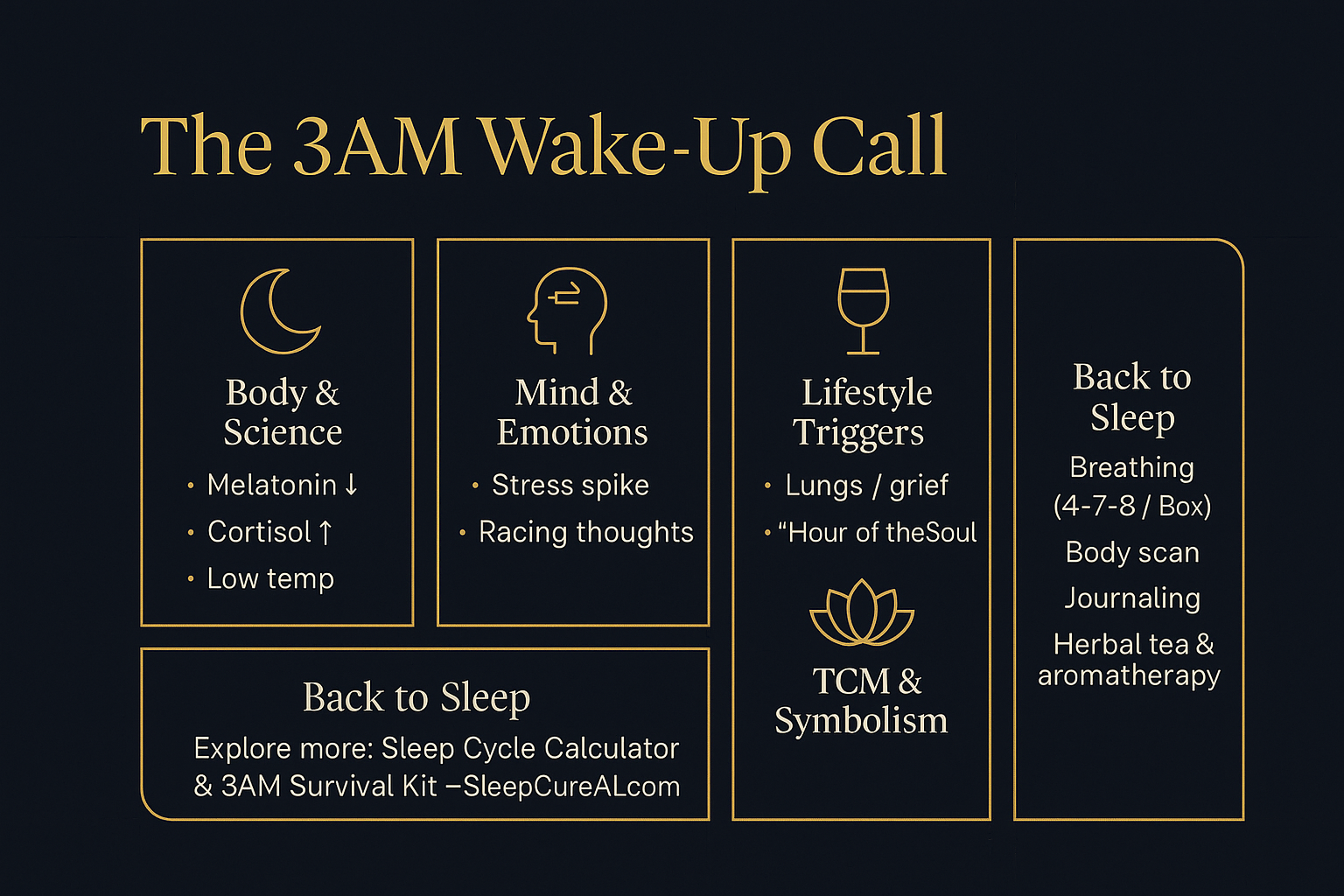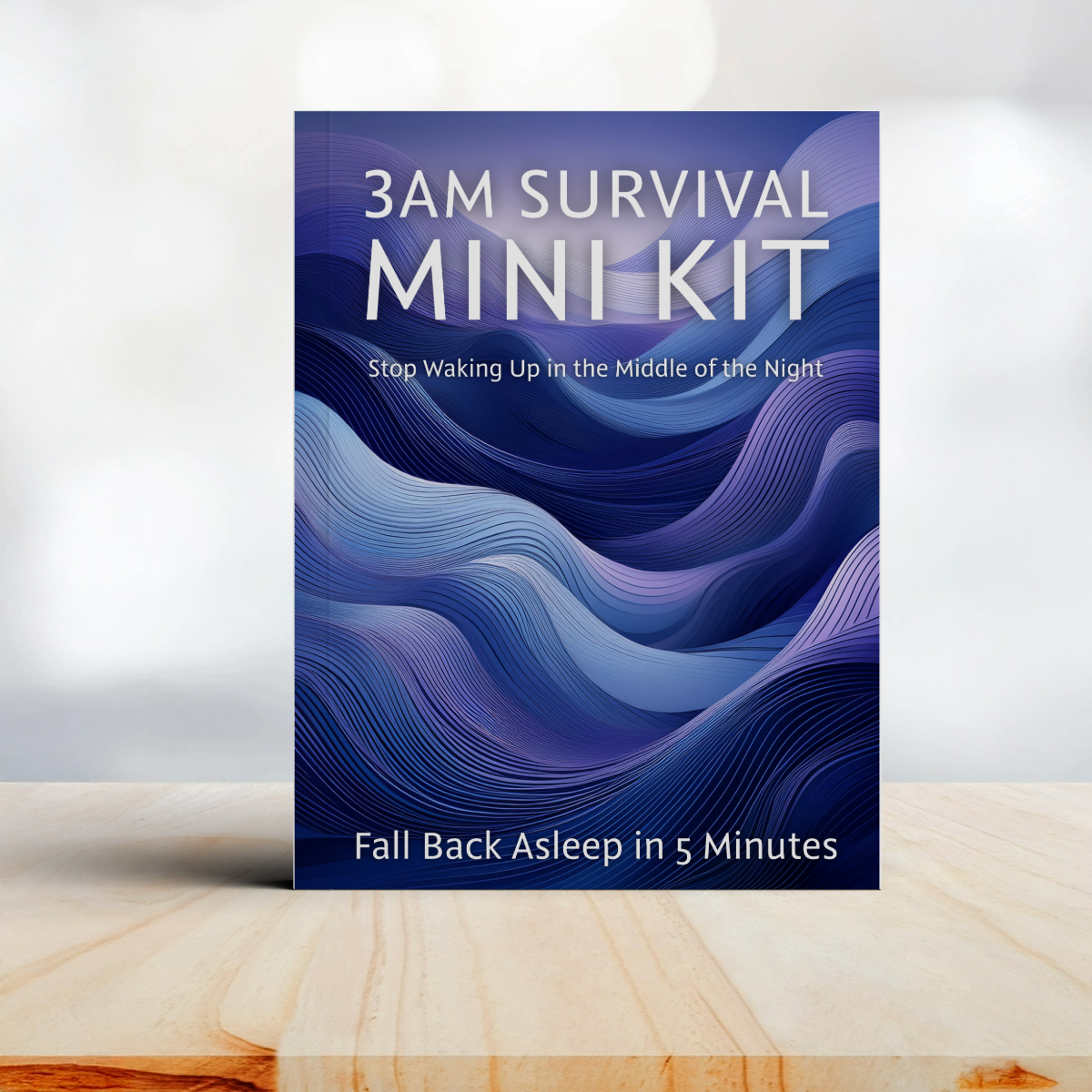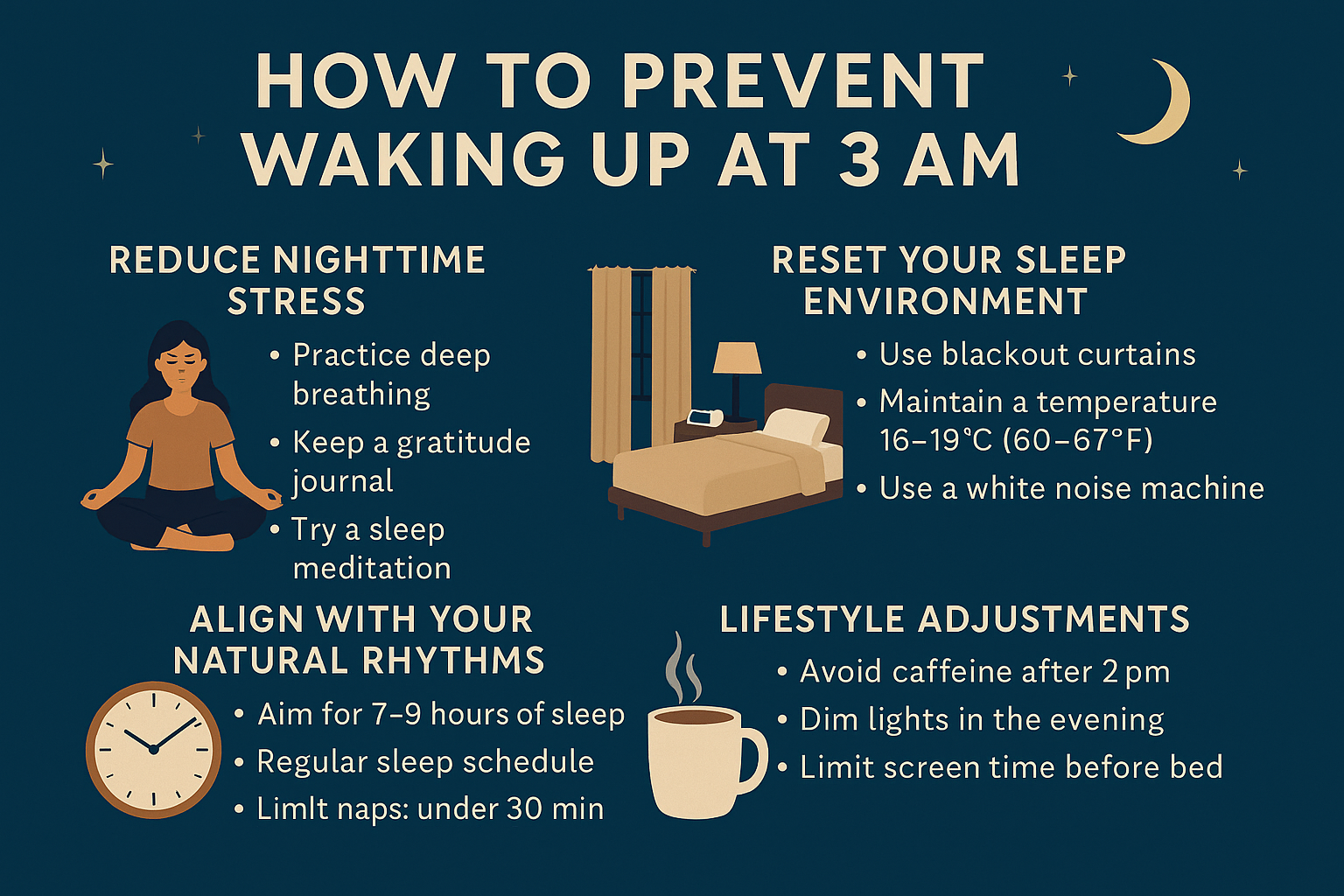Why You Wake Up at 3AM (and How to Stop It)
Published on July 3, 2025

Understanding the 3AM Wake-Up Call: Science, Symbolism, and Strategies
Waking up at 3AM and struggling to fall back asleep is more common than you might think. For some, it’s a rare annoyance. For others, it becomes a nightly ritual—one that leaves you groggy, anxious, or even fearful of bedtime itself.
By weaving together insights from modern science, traditional Chinese medicine (TCM), and holistic lifestyle approaches, you can begin to transform these disruptive nights into opportunities for calm, restoration, and even insight.
Why 3AM? What Happens in the Body
Around 3AM, your body stands at a crossroads of physiology and rhythm:
- Circadian transition: Melatonin levels begin to decline while cortisol starts its early rise.
- Lowest body temperature: Core temperature dips, making the body more fragile to disturbance.
- REM sleep activity: Dreams become emotionally intense, sometimes pulling you awake.
- TCM view: According to the Chinese body clock, the lung meridian is active from 3–5AM—linked to grief, sadness, and the process of “letting go”:contentReference[oaicite:2]{index=2}.
This convergence makes 3AM a “vulnerable window”:contentReference[oaicite:3]{index=3}. If stress, digestion, or emotional residue are present, wakefulness may be the result.

Common Causes of 3AM Wake-Ups

3AM Survival Mini Kit
Fall Back Asleep in 5 Minutes
A clear, no-nonsense guide that tells you exactly why you wake up at 3AM and what to do the moment it happens — so you can stop the adrenaline spike, calm your body, and fall back asleep within minutes. Every step is practical and designed to fix the problem right when it starts.
See What’s Inside – $4| Cause | Modern Explanation | TCM / Holistic Insight |
|---|---|---|
| Stress & Anxiety | Cortisol spikes or racing thoughts activate the nervous system. | Stagnant liver Qi or unsettled Shen (spirit of the heart) disturb rest:contentReference[oaicite:4]{index=4}. |
| Blood Sugar Dips | A nighttime crash prompts adrenaline to restore balance. | Weak spleen Qi may prevent steady nourishment, leading to internal restlessness. |
| Hormonal Shifts | Menopause, thyroid imbalances, or adrenal fatigue disrupt cycles. | Yin deficiency may cause hot flashes, dryness, or night sweats. |
| Alcohol / Caffeine | Alter sleep depth, fragment REM, or overstimulate. | Considered “heating” substances—aggravating liver and heart fire. |
| Sleep Disorders | Apnea, RLS, or chronic insomnia interrupt architecture. | Energetic stagnation in lungs or kidneys blocks smooth Qi circulation. |
The Spiritual & Symbolic Layer
Many traditions consider the hours between 3–4AM sacred:
- “Hour of the soul”: Intuition and subconscious insights rise to the surface:contentReference[oaicite:5]{index=5}.
- Christian mysticism: Sometimes called the hour of prayer.
- Buddhist practice: Dawn preparation; a time when meditation is most powerful.
- Numerology: Waking at 3:33 is often seen as a symbol of alignment and guidance:contentReference[oaicite:6]{index=6}.
Instead of resisting, you might experiment with lucid journaling—noting dreams or emotions in a bedside notebook. For some, this moment even becomes a gateway into lucid dreaming practices, where awareness within the dream expands.
First Aid at 3AM: What to Do in the Moment
When you wake, panic and frustration are your biggest enemies. Here’s a practical action plan (inspired by the 3AM Survival Kit:contentReference[oaicite:7]{index=7}):
- Pause & Accept: Whisper: “This is temporary. My body knows how to rest.”
- Breathe: Try 4–7–8 breathing or simply extend your exhale.
- Body Scan: Release tension step by step—from toes to jaw.
- Shift Focus: Use a mantra (“I rest. I renew.”) or recall a calming memory.
- Gentle Option: If still awake after 20 minutes, write your looping thought, sip warm herbal tea, or stretch lightly.
Tip: Keep a printed Emergency 3AM Checklist by your bed (included in the 3AM Survival Kit) so you don’t reach for your phone.
Evening Prevention: Protect Your Night Before It Starts
Small evening rituals prevent many awakenings:
-
Nutrition:
- Balanced evening snack (oats, yogurt, nuts) stabilizes blood sugar.
- Avoid caffeine after 2PM and heavy meals late at night.
- Explore sleep-promoting teas like chamomile, lemon balm, or passionflower.
-
Digital Hygiene:
- Switch off screens an hour before bed.
- Dim lights with warm tones.
- Remove glowing electronics from your bedroom.
-
Rituals & Environment:
- Try aromatherapy: lavender, cedarwood, or sandalwood oil in a diffuser:contentReference[oaicite:8]{index=8}.
- Keep bedroom cool (16–19°C / 60–67°F).
- Add white noise or gentle soundscapes if external noise is a problem.
TCM Insights: What Your Body is Telling You
- Waking 1–3AM: Liver imbalance; linked to anger or stress.
- Waking 3–5AM: Lungs; grief, sadness, or need for emotional release:contentReference[oaicite:9]{index=9}.
- Kidneys & Yin deficiency: Night sweats, dry mouth, or restlessness.
Practical TCM Tips:
- Gentle evening Qi Gong or Tai Chi to settle Qi.
- Acupressure: Shenmen (HT7) to calm the heart, Neiguan (PC6) to release tension, Taichong (LR3) for liver balance:contentReference[oaicite:10]{index=10}.
- Light, warm dinners—soups, steamed vegetables, or fish—support spleen and digestion.

Lifestyle Foundations for Restful Sleep
Mind
- CBT-I techniques if insomnia persists.
- Journaling to offload emotions.
- Meditation or guided sleep stories can re-train the mind.
Body
- Daily movement (walking, stretching).
- Avoid long late naps.
- Balance hydration—drink enough in the day, but limit 1–2 hours before bed.
Spirit
- Gratitude rituals before bed.
- Lucid dream exploration—turn the 3AM wake-up into a conscious bridge between waking and dreaming.
- Morning reflection: “What did this wake-up want to tell me?”
Quick Comparison: Helpful vs Harmful Habits
| Helpful Evening Habits | Harmful Evening Habits |
|---|---|
| Herbal tea, journaling, warm bath | Late caffeine, alcohol, heavy sugar |
| Aromatherapy (lavender, cedar, sandalwood) | Scrolling on phone, harsh light |
| Qi Gong, stretching, light reading | Stressful work emails or TV dramas |
| Light, warm dinner | Heavy, spicy, greasy foods |
| Acupressure on calming points | Ignoring body cues, suppressing emotions |
When to Seek Professional Support
Sometimes self-help isn’t enough:
- Medical conditions: Rule out apnea, thyroid issues, or chronic pain.
- Mental health: Anxiety, depression, or trauma may need professional care.
- Sleep clinics & specialists: Can offer CBT-I, sleep studies, or personalized plans.
Tools to Support Your Journey
- Sleep Cycle Calculator: Plan ideal bedtimes and wake-ups.
- Sleep Test: Discover your sleep profile and tailored advice.
- Sleep Tips & Gentle Strategies: Evening checklists and soothing methods.
- 3AM Survival Kit: Full guide with checklists, breathing mandalas, and nighttime rescue rituals.
Final Thoughts
Waking at 3AM does not mean you’re broken. It means your body is signaling imbalance—or inviting you into a deeper dialogue. By combining scientific strategies, TCM wisdom, and calming rituals, you can gradually reshape your nights.
Think of each 3AM wake-up not as an interruption, but as an invitation—to rest, to heal, and perhaps even to listen more closely to yourself.
Quick Summary Table
| Area | Actions You Can Try Tonight |
|---|---|
| Mind | Breathing, journaling, gratitude, CBT-I techniques |
| Body | Acupressure, herbal tea, blackout curtains, temperature 18°C |
| Spirit | Treat wake-up as “hour of the soul,” practice gentle reflection or prayer |
| Diet | Avoid sugar/caffeine late, light warm meals, magnesium-rich foods |
| Environment | Blackout curtains, quiet, supportive pillow and mattress |
Want More Support?
Get our free guide Acupressure for Better Sleep for practical step-by-step techniques.
Or explore the full 3AM Survival Kit—your bedside handbook for middle-of-the-night awakenings.
Sleep doesn’t have to be a struggle. With gentle awareness and the right tools, each night can become an opportunity to reset, heal, and renew.
Frequently Asked Questions
Martin Lain — Sleep Researcher & Creator of SleepCureAI
Martin Lain combines modern sleep science, circadian-rhythm research, TCM-inspired insights, and AI-based pattern analysis to help people understand their sleep more deeply. His work integrates gentle nighttime rituals, nervous system regulation, and data-driven tools.
Medically Reviewed by
Dr. Mei Lin, DACM – TCM Sleep Medicine Specialist
(Editorial Medical Reviewer Persona)
Dr. Mei Lin is an editorial medical reviewer specializing in Traditional Chinese Medicine. Her expertise focuses on the relationship between Yin–Yang balance, Shen (Heart spirit), Liver Qi regulation, and the Kidney's role in nighttime restoration. Her review ensures that SleepCureAI articles align with foundational TCM sleep principles and classical physiological patterns described in traditional sources.
- Yin deficiency and difficulty sleeping
- Liver Qi stagnation and 1–3AM wake-ups
- Kidney Yin and nighttime restoration
This reviewer profile represents an editorial medical persona used for accuracy review of TCM-related sleep concepts.
Reviewed by SleepCureAI Sleep Engine (Beta)
A machine-learning model trained on circadian rhythm science, Traditional Chinese Medicine sleep physiology, and behavioral sleep optimization frameworks. This system reviews each article for timing accuracy, emotional–physiological coherence, and alignment with safe sleep practices.
- Circadian rhythm consistency
- Nervous system safety & regulation insights
- TCM coherence (Yin–Yang, Liver Qi, Shen)
- Evidence-based lifestyle recommendations
Disclaimer: This AI system does not diagnose medical conditions and does not replace professional care.